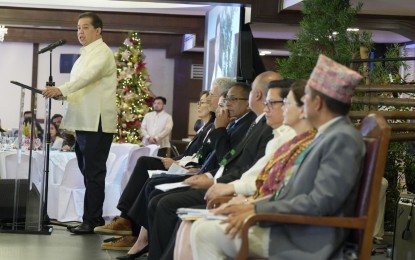
SUSTAINABLE DEV’T GOALS. Speaker Ferdinand Martin G. Romualdez (left) addresses the participants of the 4th Asia-Pacific Evaluation Association Conference at the House of Representatives on Thursday (Dec. 7, 2023). Romualdez said the path to achieving the United Nations Sustainable Development Goals is one where everyone must walk together to create a future where sustainable development is not a goal but a reality. (Photo courtesy of House Speaker’s office)
MANILA – The House of Representatives is committed to pursuing program and project monitoring and evaluation as an aspect of governance, and to helping achieve the United Nations 2030 Sustainable Development Goals (SDGs), particularly in reducing poverty, House Speaker Ferdinand Martin G. Romualdez said Thursday.
He made the assurance in a speech keynoting the 4th Asia-Pacific Evaluation Association (APEA) Conference Parliament Day in Congress.
“The House leadership is fully committed to the aspirations of the 4th APEA Conference to institutionalize evidence-based decision-making for national development and the SDGs,” Romualdez told the participants of the conference’s Parliament Day.
He pointed out that the Philippine Development Plan 2023-2028, under the leadership of President Ferdinand R. Marcos Jr., for the first time includes the enactment of a National Evaluation Policy (NEP) as a priority.
“This policy is a testament to our commitment to improving governance quality and promoting efficiency in our bureaucratic processes,” he said.
He informed the conference that the House has proposed to include NEP as a “key legislative measure” to be prioritized by the Legislative-Executive Development Advisory Council (LEDAC).
“The enactment of this policy will strengthen our legal and institutional framework for conducting regular evaluations of government interventions, fostering a culture of evaluation in the public sector,” Romualdez said.
The strategy is in line with the country’s international commitments to the United Nations on strengthening national evaluation capacity, serving as a key strategy to achieve the SDGs, he added.
“Effective monitoring and evaluation are at the heart of good governance. They allow us to gauge the impact of our policies, learn from our successes and failures, and make informed decisions. In the Philippines, we are integrating monitoring and evaluation into our governance processes, ensuring that our interventions are not just well-intentioned but well-informed and effective,” he stressed.
On attaining the SDGs, Romualdez said the 2030 deadline is a challenge for parliamentarians to “act swiftly and strategically” despite the fiscal constraints shadowing many nations, including the Philippines.
He noted that the 2023 United Nations SDG Report paints a sobering picture of the global community grappling with poverty, hunger, and climate change.
He said the Covid-19 pandemic, in tandem with ongoing armed conflicts and climate crises, has not only stalled but in many cases reversed progress.
“As we witness learning losses, rising poverty, and growing inequality, it is a clarion call to reinvigorate our efforts,” he said.
“This urgency demands innovative solutions, leveraging every resource available to ensure that our progress is not only regained but accelerated. In this global endeavor, the role of national parliaments is paramount. Our responsibilities extend beyond legislation and budget adoption; we are the custodians of accountability and progress,” he added.
Romualdez pointed out that parliaments around the world have successfully influenced policy and implementation of the SDGs - from legislating on environmental protection in the European Union to budgeting for education reforms in African nations.
However, he said the path to achieving the SDGs is one where everyone must walk together, with governments, civil societies and international agencies having a role to play.
“Your expertise, your experiences, and your support are invaluable in this journey. Together, we can create a future where sustainable development is not a goal but a reality,” Romualdez said.
“Let us remind ourselves of the weight of responsibility we carry and the impact of the work we do. The path ahead is challenging, but with our united efforts, it is a path that leads to hope, progress, and a better world for future generations,” he added. (PNA)
